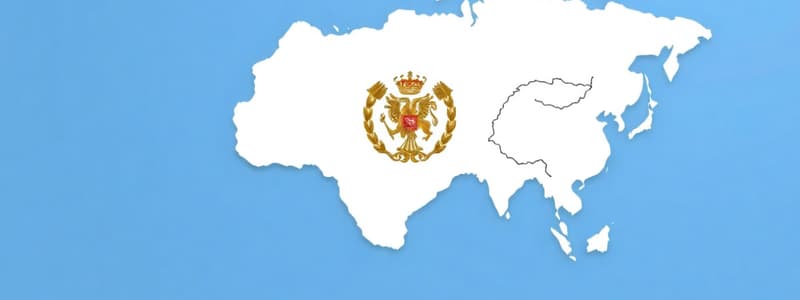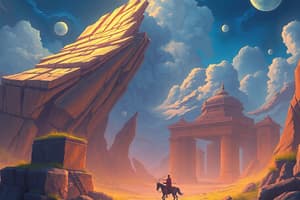Podcast
Questions and Answers
What is meant by the term 'state' in a political context?
What is meant by the term 'state' in a political context?
A 'state' refers to a political entity with a defined territory, a permanent population, a government, and the capacity to enter into relations with other states.
How does a state differ from a nation?
How does a state differ from a nation?
A state is a political and legal entity, while a nation refers to a group of people sharing common cultural characteristics, such as language or ethnicity.
What components are necessary for the establishment of a state?
What components are necessary for the establishment of a state?
A state requires defined territory, a stable population, a government, and the ability to engage in diplomatic relations.
Can a territory be considered a state if it lacks a government?
Can a territory be considered a state if it lacks a government?
In what ways can states interact with one another?
In what ways can states interact with one another?
Flashcards
State definition
State definition
The state is a political entity with a defined territory, permanent population, and sovereign government.
State's territory
State's territory
A clearly defined geographic area controlled by the state.
State's population
State's population
The people residing within the state's geographic limits.
State's government
State's government
Signup and view all the flashcards
State's sovereignty
State's sovereignty
Signup and view all the flashcards
Study Notes
Definitions of State
- A state is a politically organized territory administered by a sovereign government. It controls its borders and its population, and is recognized by other states.
- A state is distinct from a country, although often used synonymously, as it's a more technical political term.
- A state's essential components include a defined territory, a permanent population, a government, and the capacity to enter into relations with other states.
Key Characteristics of a State
- Sovereignty: This is the supreme power of a state within its territory. It has ultimate authority and is independent from external control. Sovereignty entails the ability to make and enforce laws, defend the territory, and control its internal affairs.
- Defined Territory: A state must have clearly demarcated borders, separating it from other states.
- Permanent Population: A state requires a settled population that resides within its territory, giving the state a sense of identity and continuity across time.
- Government: A state has a functioning government that is recognized by the population and other states. This government exercises political authority to maintain order and provide public services.
- Capacity to Enter Relations with Other States: The ability to engage in diplomatic activities and form agreements with other states is an important aspect of statehood.
State vs. Nation
- A state is a political entity, while a nation is a group of people sharing a common culture, language, history, or ethnicity.
- A nation may inhabit multiple states, or a single state may contain multiple nations.
- The concepts are distinct, but often overlap and interact in complex ways.
Evolution of Statehood
- The concept of the state has evolved over time, shaped by factors like colonialism, war, social movements, and the changing international order.
- Modern notions of the state are largely rooted in the Enlightenment and the rise of the nation-state system.
- The historical evolution of the state demonstrates its dynamic nature, and how its characteristics have changed over centuries.
Modern State Structures
- Variations Exist: States can have varying degrees of democratic or authoritarian structures, different economic systems (capitalist, socialist, mixed), and diverse levels of social development.
- These factors are important in understanding the various roles states play in society and the ways they interact with their citizens.
- The function and form of the government vary greatly between different states.
State and Governance
- The governing processes within a state influence how state power is implemented and how citizens interact with their government.
- This aspect includes how laws are made, how elections work, the role of the judiciary, and the general organization of the state's institutions.
- The stability and efficiency of these governing processes directly impact a state's capacity to provide services to its population.
Studying That Suits You
Use AI to generate personalized quizzes and flashcards to suit your learning preferences.




